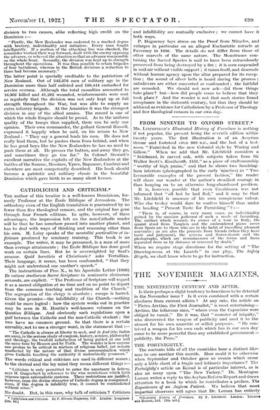CATHOLICISM AND CRITICISM.* Tim author of this treatise is a
well-known Dominican, for- merly Professor at the Ecole Biblique of Jerusalem. The orthodoxy even of the English translation is guaranteed by no fewer than five theological censors, and the original has gone through four French editions. In spite, however, of these advantages, the impression left on the non-Catholic reader will be that he has somehow passed into another planet, and has to deal with ways of thinking and reasoning other than his own. M. Loisy speaks of the mentalite particuliAre et in- prieure produced by seminary training. This book is an example. The writer, it may be presumed, is a man of more than average attainments ; the Ecole Biblique has done good work on certain lines. But he is overweighted by Saul's armour. Quid licereticis et Christianis ? asks Tertullian. Their language, it seems, has been confounded, " that they might not understand one another's speech."
The instructions of Pius X., in his Apostolic Letter (1906) IJe ration studio-rum Sacra Scriptures in seminariis clericorum servanda, are explicit. " The Professor of Scripture will regard it as a sacred obligation at no time and on no point to depart from the common teaching and tradition of the Church." The segregation of the clergy is absolute ; escape is barred. Given the premiss—the infallibility of the Church—nothing could be more logical : how the system works out in practice may be seen in M. Routin's well-known volumes on the Question Biblique. And obviously such regulations open a gulf between the Catholic and the non-Catholic student ; the two have no common ground. So that there is a certain unreality,not to use a stronger word, in the statement that " The Catholic is always at liberty to seek, and to find (the italics are ours), in the serious study of exegesis, history, science, philosophy and theology, the twofold satisfaction of being guided at one and the same time by Reason andby Faith. The wonder is how anyone can profess to be critical in matters of religious belief, yet remain unaffected by the nature of that divine communication which gives Catholic teaching the authority it undoubtedly possesses."
The words critical and criticism are used in different senses ; to the clerical and the lay mind they mean different things :-
" Criticism is only permitted to enter the sanctuary in fetters, says AL Guignebert in reference to the wise restrictions which faith imposesupon rationalistic systems. These restrictions are justified, however, once -the divine character of Catholic dogma is recognized ; since, if this dogma is infallibly true, it cannot be contradicted without error."
No doubt. But, in this case, why talk of criticism ? Criticism •
Me. e] Ccdamielanatinti Criticism. By P. Etienne Hugneney, 08. London: Longman'.
and infallibility are mutually exclusive ; we cannot have it both ways.
P. Hugueney lays stress on the Proof from Miracles, and enlarges in particular on an alleged Eucharistic miracle at Faverney in 1608. The details do not differ from those of other marvels of the same nature. The Monstrance con- taining the Sacred Species is said to have been miraculously preserved from being destroyed by a fire ; it is seen suspended in mid-air without visible support ; it raises itself, and descends without human agency upon the altar prepared for its recep- tion ; the sound of silver bells is heard during the process ; unbelievers are either converted or confounded ; the faithful are consoled. We should not now ask—did these things take place? but—how did people come to believe that they took place ? And the wonder is not that such stories found acceptance in the sixteenth century, but that they should be adduced as evidence for Catholicism by a Professor of Theology and five theological censors in our own day.


























































 Previous page
Previous page